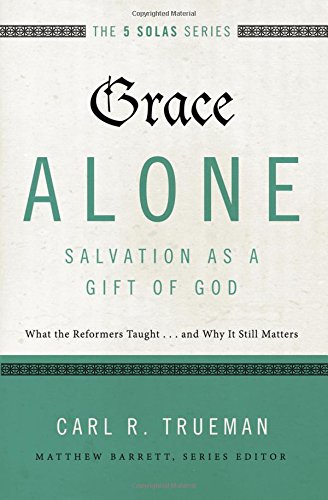A Brief Book Summary from Books At a Glance
By Steve West
About the Author
Dr. Carl Trueman is professor of historical theology and church history at Westminster Theological Seminary. He is the author of numerous books and articles.
Introduction
Grace Alone is Carl Trueman’s contribution to The 5 Solas Series. In this book, Trueman explores the meaning and significance of sola gratia, grace alone. His treatment is biblical, theological, and historical. Trueman also applies the doctrine of grace alone to the life of the church and contemporary practice.
Table of Contents
Introduction
Chapter 1 Grace in the Bible
Chapter 2 Grace Narrated: Augustine’s Confessions
Chapter 3 Grace Contested: Augustine versus Pelagius
Chapter 4 Unexpected Ally: Thomas Aquinas
Chapter 5 Justification by Grace: Martin Luther
Chapter 6 Grace Reformed: John Calvin and the Reformed Tradition
Chapter 7 The Church
Chapter 8 The Word
Chapter 9 The Sacraments: Baptism and the Lord’s Supper
Chapter 10 Prayer
Conclusion
Summary
Chapter 1: Grace in the Bible
The Scriptures alone are our final authority, so we must see what the Bible teaches about grace. God’s grace permeates the Bible. Grace is the unmerited favor of God. Saving grace brings salvation, and common grace brings non-salvific blessings to the undeserving. God’s work in the church for salvation and the maturing of his children is also grace. Grace is not a proper attribute of God’s nature, but a relational application of his character to sinners. God chooses to be gracious and merciful to the rebellious. God’s grace is tied to and administered through his covenants. Israel’s early identity was shaped by God’s gracious redemption of them from slavery in Egypt, and it was God’s grace that allowed Israel to have peace and be blessed. The sacrificial system was designed by God. Grace does not mean that sin is ignored—sacrifice, blood, and atonement are necessary. The sacrificial system itself was established by God as a gracious gift. Even before the Mosaic law, however, God had demonstrated that sacrifice was necessary for sin, and that God himself would ultimately provide the substitutionary atonement. Prayers for grace often focused on the temple and sacrifice, since that’s where God’s grace was displayed and that’s where sin was dealt with. Psalms shows us the need of grace, that we are to cry out for grace, and that grace is foundational for our relationship with God. The prophets proclaim the grace of God, with Isaiah reaching the heights by seeing the connection between God’s grace and the substitutionary work of the Servant of the Lord.
Jesus Christ brings all of the lines of OT grace together and is the highest manifestation of God’s favor. Jesus is the fulfillment of God’s plan in the OT, and as the perfect high priest he offers himself as a perfect sacrifice for our sins. This is incredible grace. Christ is so important that he also brings about a new creation, inaugurating the new age. Jesus is the embodiment of God’s grace. We are dead in trespasses and sins, but in grace God makes us alive. God takes the initiative to elect sinners in Christ to be saved, and those he elects he regenerates by his Spirit and gives them life. God’s grace changes us so that we can live holy lives and honor God in our ethics. Grace cleanses and transforms sinners. Benedictions and prayers in the NT highlight that the church exists by God’s grace and is entirely dependent upon it.
Chapter 2: Grace Narrated: Augustine’s Confessions
Augustine, the North African bishop who wrote in the late fourth and early fifth centuries, has shaped all subsequent discussions about grace. Augustine has been claimed by many diverse thinkers and denominations as their own. He did not consider grace merely in the abstract—reflections on grace fill his autobiography. We do not find a lot of theological elaboration about grace in the church fathers before Augustine. In Confessions, Augustine presents to God a prayer and praise for how God, in grace, saved and transformed Augustine’s life. He notes that the human heart is always. . .
[To continue reading this summary, please see below....]The remainder of this article is premium content. Become a member to continue reading.
Already have an account? Sign In
